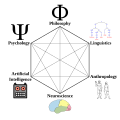intentionality, perception and categorization of the environment. The classical theory of categorization, is a term used in cognitive linguistics to denote the...
57 KB (6,981 words) - 04:10, 9 January 2025
Classification (redirect from Computational models of categorization)
(disambiguation) Classified (disambiguation) Classifier (disambiguation) Cognitive categorization Data classification (disambiguation) Classification theorem Folk...
4 KB (495 words) - 16:43, 9 March 2025
Category (Vaisheshika) Stoic categories Category mistake Cognitive categorization, categories in cognitive science Statistical classification, statistical methods...
2 KB (262 words) - 14:46, 28 December 2024
however predates the formal statement of self-categorization theory. In self-categorization theory, categorizing people does not simply involve the redescription...
41 KB (4,623 words) - 11:40, 22 October 2024
Prototype theory (redirect from Graded categorization)
Prototype theory is a theory of categorization in cognitive science, particularly in psychology and cognitive linguistics, in which there is a graded...
31 KB (4,176 words) - 07:17, 20 November 2024
Intellectual Factors in Categorization New York, Cambridge University Press. Croft, William and Cruse, D. Alan (2004) Cognitive Linguistics, Cambridge:...
1 KB (107 words) - 13:58, 19 January 2024
Cognitive behavioral therapy (CBT) is a form of psychotherapy that aims to reduce symptoms of various mental health conditions, primarily depression,...
166 KB (18,361 words) - 13:29, 23 April 2025
microtheories/"middle-range" theories) modelling specific cognitive faculties (e.g. vision, language, categorization etc.). Research methods borrowed directly from...
74 KB (8,629 words) - 20:55, 22 April 2025
The cognitive revolution was an intellectual movement that began in the 1950s as an interdisciplinary study of the mind and its processes, from which...
30 KB (3,735 words) - 17:16, 18 March 2025
The theory of vicarious cognitive dissonance combines social identity theory, self-categorization theory, and personal cognitive dissonance theory. Individuals...
19 KB (2,257 words) - 03:53, 15 November 2024
Piaget's theory of cognitive development, or his genetic epistemology, is a comprehensive theory about the nature and development of human intelligence...
88 KB (10,537 words) - 02:18, 2 May 2025
Eleanor Rosch (category Women cognitive scientists)
California, Berkeley, specializing in cognitive psychology and primarily known for her work on categorization, in particular her prototype theory, which...
11 KB (1,062 words) - 23:20, 28 February 2025
hypothesis that cognitive systems behave like rational Bayesian agents in particular types of tasks. Past work has applied this idea to categorization, language...
2 KB (231 words) - 23:12, 22 October 2023
(1999). "Ontology and Geographic Objects: an empirical study of cognitive categorization". In Freksa, Christian; Mark, Davis M. (eds.). Spatial Information...
20 KB (2,354 words) - 14:36, 30 April 2025
Implicit stereotype (category Cognitive biases)
Bavel (2016) propose that such biases originate from automatic cognitive categorization ("us vs. them") rather than explicit prejudice. This tendency emerges...
61 KB (7,438 words) - 20:18, 1 May 2025
experiences." Cognitive Rigor is the superposition of Bloom's Taxonomy and Webb's Depth-of-Knowledge levels and is used to categorize the level of abstraction...
6 KB (701 words) - 15:17, 2 May 2024
larger group of cognitive behavioral therapies (CBT) and was first expounded by Beck in the 1960s. Cognitive therapy is based on the cognitive model, which...
27 KB (3,242 words) - 17:20, 3 May 2025
behavioral plans Thoughts of avoidance Any other thoughts that were not categorized Cognitive restructuring has been used to help individuals experiencing a variety...
14 KB (1,475 words) - 06:49, 6 October 2024
Neuroenhancement (redirect from Cognitive enhancer)
Neuroenhancement or cognitive enhancement is the experimental use of pharmacological or non-pharmacological methods intended to improve cognitive and affective...
26 KB (2,483 words) - 08:39, 1 April 2025
Race is a categorization of humans based on shared physical or social qualities into groups generally viewed as distinct within a given society. The term...
210 KB (23,434 words) - 11:02, 29 March 2025
and Cognitive Linguistics; and this, again, affects adjacent research fields including language development and language acquisition. Categorization Induction...
46 KB (5,560 words) - 17:18, 27 March 2025
cognition. Other advocates for cognitive anthropology’s categorization with cognitive science have pointed out that cognitive psychology fails to encompass...
13 KB (1,466 words) - 16:59, 13 July 2024
Semantics (redirect from Cognitive meaning)
of grammar. Other investigated phenomena include categorization, which is understood as a cognitive heuristic to avoid information overload by regarding...
134 KB (14,282 words) - 19:41, 28 April 2025
learning, and cognitive modeling. As argued by Leslie Valiant and others, the effective construction of rich computational cognitive models demands the...
18 KB (1,869 words) - 17:59, 12 April 2025
Emotion (redirect from Cognitive theory of emotion)
involving multiple different components, such as subjective experience, cognitive processes, expressive behavior, psychophysiological changes, and instrumental...
138 KB (16,263 words) - 20:20, 27 April 2025
Cognitive semantics is part of the cognitive linguistics movement. Semantics is the study of linguistic meaning. Cognitive semantics holds that language...
23 KB (3,302 words) - 14:23, 1 April 2025
processing such as categorization. Cheetham et al. have argued that the uncanny valley effect can be understood in terms of categorization processes, with...
84 KB (8,790 words) - 14:45, 29 April 2025
Concept (category Cognitive science)
a subset of them. The use of concepts is necessary to cognitive processes such as categorization, memory, decision making, learning, and inference. Concepts...
37 KB (4,725 words) - 20:29, 10 March 2025
determination by the object." Consciously, in an extravert, the four basic cognitive functions follow the extraverted 'general attitude of consciousness':...
77 KB (3,857 words) - 19:59, 16 April 2025
VUCA (section Social categorization)
occurrences cause certain social categorization is known as volatility and is one of the main aspects of self-categorization theory. Sociologists use volatility...
24 KB (2,900 words) - 15:15, 20 January 2025








